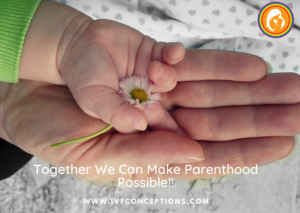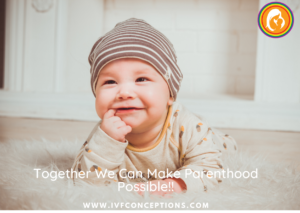How to Conceive Twins via IVF: A Comprehensive Guide

Many intended parents dream of having twins, and for some, in vitro fertilization (IVF) offers a potential pathway to make this dream a reality. While IVF doesn’t guarantee twins, it can increase the likelihood compared to natural conception. Understanding the factors that influence twin pregnancies in IVF, along with the associated risks and considerations, is essential before embarking on this journey.
In this blog post, we’ll cover the basics of how IVF can increase your chances of having twins, factors that play a role in twin conception, and the medical and emotional aspects to consider.
Why Do Twins Happen?
To comprehend how to increase your chances of having twins, it’s essential to understand why twin pregnancies occur. There are two types of twins: identical and nonidentical (fraternal) twins.
Identical twins occur when a single fertilized egg splits into two separate embryos. These embryos, known as monozygotic twins, have identical genes, are the same sex, and bear a striking resemblance to each other.
Nonidentical twins happen when two separate eggs are present in the womb at the time of fertilization, and each egg is fertilized by a different sperm. These embryos, called dizygotic twins, do not share identical genes and may not be the same sex.

IVF and Twins: How It Works
IVF is a fertility treatment where eggs are retrieved from the ovaries, fertilized in a lab, and then transferred into the uterus. In cases where multiple embryos are transferred during the procedure, the chance of twins or higher-order multiples increases. However, not all embryos will implant and result in a viable pregnancy.
In IVF, the following two scenarios can lead to twins:
Multiple Embryo Transfer
- How It Works: During an IVF cycle, more than one embryo can be transferred into the uterus to improve the chances of pregnancy. When more than one embryo implants successfully, it can result in a twin pregnancy. This is the most common way IVF results in twins.
- Success Rate: The transfer of multiple embryos can increase the chance of twins by up to 20-30% depending on factors such as maternal age, embryo quality, and the fertility clinic’s protocol.
Embryo Splitting
- How It Works: Sometimes, even a single embryo may split after it has been transferred into the uterus, leading to identical twins. This is less common, but it is a possible outcome in both natural conception and IVF.
- Success Rate: The chance of embryo splitting into identical twins is around 1-2% but could slightly increase due to hormonal stimulation in IVF.
Factors That Influence Twin Conception via IVF
While IVF increases the likelihood of twins, several factors can further enhance the chances. Here are some key influences:
1 Maternal Age
- Older Women (35-40 Years): Women over the age of 35 who undergo IVF are more likely to have twins due to hormonal stimulation, which encourages the release of more than one egg. IVF often involves the transfer of multiple embryos in older women to increase the chances of conception, which can result in twins.
- Younger Women (Under 35 Years): In younger women, fertility clinics may recommend transferring only one embryo at a time to avoid the risks associated with multiple pregnancies.
2 Embryo Quality
- High-quality embryos are more likely to result in a successful pregnancy. When two or more high-quality embryos are transferred, the chances of both implanting and developing into twins increases.
3 Number of Embryos Transferred
- The number of embryos transferred during IVF plays a crucial role in determining the likelihood of twins. Transferring two embryos significantly increases the chances of twins, while transferring just one embryo reduces this risk. However, some clinics are now advocating for single embryo transfer (SET) to avoid complications.
4 Use of Fertility Medications
- Fertility medications like gonadotropins, which stimulate the ovaries to produce multiple eggs, increase the chance of twins. While these drugs are part of the IVF process, they also raise the likelihood of conceiving multiples.
Risks of Conceiving Twins via IVF
While the idea of having twins might sound appealing to many, it’s essential to understand the risks associated with twin pregnancies. The risks associated with twins are higher than for singletons, whether conceived naturally or via IVF.
1 Increased Health Risks for the Mother
- Gestational Diabetes: Women pregnant with twins are at a higher risk of developing gestational diabetes.
- Preeclampsia: A condition characterized by high blood pressure and signs of damage to other organ systems, often occurs more frequently in twin pregnancies.
- Preterm Labor: Women carrying twins are at a higher risk of delivering preterm, with most twin pregnancies delivering around 36 weeks, compared to 40 weeks for a single pregnancy.
2 Higher Risk of Complications for the Babies
- Low Birth Weight: Twins are more likely to be born with low birth weight due to being born earlier.
- Premature Birth: As mentioned, twins are often born prematurely, which increases the risk of respiratory problems, developmental delays, and other health concerns.
3 Increased Medical Costs
- Twin pregnancies usually require more medical care, including more frequent doctor visits, ultrasounds, and potentially longer hospital stays, all of which can increase the overall cost.
Increasing Your Chances of Twins via IVF: What You Can Do
If you are considering IVF and would like to increase your chances of having twins, there are several approaches to consider:
1 Talk to Your Doctor About Multiple Embryo Transfer
- Ask your fertility specialist about the possibility of transferring two or more embryos during IVF. However, it’s essential to weigh the benefits against the risks associated with multiple pregnancies.
2 Consider Using Donor Eggs
- If you are using donor eggs, especially from a younger donor, the success rate of IVF is higher. The implantation rates are also better, which can increase the chances of twins if multiple embryos are transferred.
3 Optimize Your Health
- Ensure you are in good health before starting IVF. Proper nutrition, regular exercise, and avoiding harmful substances can improve the overall success rate of IVF and increase the chances of a successful twin pregnancy.
4 Fertility Medications
- Talk to your doctor about the possibility of using fertility medications such as gonadotropins to increase the number of eggs produced during ovarian stimulation. However, be aware that these medications increase the risk of multiples, including triplets or more.
The Science Behind Conceiving Twins
Due to the rising average maternal age and the associated increase in assisted reproductive techniques, in particular fertility drugs, multiple births are more prevalent than in the past. More than 90% of births are accounted for by twins. The twins are the (monozygotic) and fraternal (dizygotic) types.
One fertilized egg (ovum) splits into two babies, who have the same genetic material, to make identical twins or monozygotic. It differs from fraternal twins(dizygotic), which fertilize two sperm and two eggs (ova) and produce two children with different genes.
Causes of Twins Pregnancy -Factors That Increase the Odds of Having Twins
These twins can be born with the help of treatments or without the treatments. It is important to know the conceiving of twins with the help of normal factors.
The factors apart from treatments that cause twin births are –
#1. Family History
A family history of the same twins does not increase the chance of multiples. If you have non-identical twins within your family, however, you will be more likely to conceive twins. If both mom and father have fraternal twins, the chances are even higher for the twins. According to the ASRM, twins are produced in about one woman who is non-identical twins in every 60 births. The chance of twins is only 1 in 125 births for men who are non-identical twins.
#2. Height
Women who have twins are higher than average. In one study, women with an average height of 164.8 cm are more likely to conceive twins than the average of 161.7 cm. It’s not obvious if these findings are because of which reason but one reason can be good nutrition among such females.
#3. Age
Women older than 30 have a higher risk of developing twins due to the rise in the FSH hormone as a woman gets older. FSH is responsible for developing eggs in the ovaries before it is released, or follicle-stimulating hormone. A woman requires higher rates of FSH, as eggs need more stimulation than a younger woman. It is somewhat ironic, as increased FSH is often caused by decreased infertility. However, follicles sometimes overact to a higher level of FSH and release two or more eggs, leading to a twin pregnancy.
#4. Weight
Obese women — with a BMI greater than 30 — conceive twins rather than women with a healthier BMI. The situation is ironic as overweight women also harder to conceive.
Extra fat results in higher estrogen levels. The greater estrogen levels can cause ovaries to over-stimulate. The ovaries can release two or more, rather than just one egg during ovulation.
- Diet – While research is still underway, some studies have shown that women who consume more dairy products have a better chance of conceiving doubles. One hypothesis is that cows’ growth hormones influence human hormone levels.
- Breastfeed – Women who conceive of breastfeeding prefer to conceive of doubles rather than women who do not. Indeed, breastfeeding can also prevent and eradicate fertility, particularly when the baby is breastfed solely during the first six months of a baby. Although you will get pregnant when you breastfeed — and the twins!
- Other factors – In women who have had multiple pregnancies and large families, twins are more common. In the meantime, Africans often conceive twins more frequently than Caucasian women and Asian women conceive of twins at least.
#5. Fertility Treatments
Fertility treatments significantly increase the chances of having twins. Different types of fertility treatment can impact the likelihood of conceiving twins:
- Fertility Drugs: Some medications stimulate a woman’s ovaries, potentially leading to the release of more than one egg. If both eggs are fertilized, this can result in twins.
- In Vitro Fertilization (IVF): During IVF, eggs are extracted from the woman’s ovaries and fertilized with sperm in a laboratory. The resulting embryos are then transferred to the woman’s womb. To increase the chances of success, healthcare professionals may implant more than one embryo, which can lead to twin pregnancies if both embryos implant and develop successfully.
 How common are twins?
How common are twins?
Twin birth rates in the United States rose over 75% from 1980 to 2009. In the United States, an estimated 3% of pregnant women are carrying twins annually.
Twins happen in roughly 1 out of 250 births, according to the American Society for Reproductive Medicine. In women receiving fertility treatments, the rate is much higher. Approximately 1 in 3 pregnancies with fertility treatment will be twins, according to the American Society for Reproductive Medicine.
Risks associated with twin pregnancies
Twin pregnancies not only carry the joy of growing up two babies but also carries the baggage of risks and complications that may arise out of twin pregnancies.
These risks and complications of twins pregnancy are as follows –
- Cesarean delivery
- Premature birth
- The low weight of the babies
- Diabetes during pregnancy
- Cerebral palsy in the child
- Autism in child
- Preeclampsia
Read more about twins pregnancy in surrogate mother:
Surrogacy twins babies with different fathers
What are the Risks for Surrogates with Twins?
What do You Need to Know About the Costs of Surrogacy with Twins?
Ethical Considerations of Twins via IVF
While some parents may hope for twins, it is crucial to consider the ethical implications of transferring multiple embryos:
1 Health Risks
- The health risks to both the mother and the babies are significantly higher in twin pregnancies. Many fertility clinics recommend single embryo transfer to reduce these risks.
2 Emotional and Financial Responsibility
- Raising twins can be emotionally and financially demanding. From higher medical expenses to increased daily caregiving tasks, it’s important to be prepared for the challenges that come with having two babies at once.
3 Medical Guidelines
- In recent years, many countries and fertility clinics have started to advocate for single embryo transfers (SET) to minimize the risks associated with twin pregnancies. Intended parents should discuss these recommendations with their fertility specialist.
 Conclusion
Conclusion
While there are no guaranteed methods to naturally increase your chances of having twins, understanding the factors that contribute to twin pregnancies can empower you to make informed choices. Factors such as age, family history, racial background, and fertility treatments play significant roles.
IVF provides an opportunity for many intended parents to conceive twins, but it’s important to approach the process with a thorough understanding of the potential risks and outcomes.
By transferring multiple embryos, utilizing fertility medications, or leveraging donor eggs, you can increase your chances of having twins. However, it’s essential to consider the health risks and ethical implications before making a decision.
Consulting with an experienced fertility specialist will help ensure the best approach for your unique situation. While the desire for twins is understandable, the primary goal of IVF is to achieve a healthy pregnancy and, ultimately, a healthy baby (or babies).
If you’d like to learn more about IVF, Egg Donation, or surrogacy services globally, check out the rest of our website: IVF Conceptions. We offer legally secure and affordable surrogacy consulting services for FREE.
Get in touch for a Free Surrogacy Consultancy:
📲 +91-8800481100 ( WhatsApp, Line, Viber)

FAQs for How to Conceive Twins
Can you naturally increase your chances of having twins?
Yes, certain factors may increase your chances of having twins naturally.
These factors include genetics, age, height, weight, and family history. Identical twins occur when a single fertilized egg divides into two, while fraternal twins result from the fertilization of two separate eggs by two separate sperm cells.
The chances of having identical twins are relatively rare, around 3 or 4 in every 1,000 births.
What are the factors that contribute to conceiving twins?
Several factors contribute to conceiving twins, including
- genetics,
- age,
- height,
- weight, and the use of fertility treatments.
Genetic factors play a significant role, with a family history of twins increasing the chances of having twins.
Is there a specific diet that can increase the likelihood of conceiving twins?
There is no specific diet that has been scientifically proven to increase the likelihood of conceiving twins. While certain factors like age, genetics, and weight can influence the chances of having twins, there is no conclusive evidence that specific foods or diets can increase the likelihood.
Are there any medical procedures that can help with conceiving twins?
Yes, certain medical procedures can help with conceiving twins. Fertility treatments, such as the use of fertility drugs or in vitro fertilization (IVF), can increase the chances of having twins.
Fertility drugs stimulate the ovaries to release multiple eggs, increasing the likelihood of fertilization and subsequent twin pregnancies.
Is there a genetic predisposition to conceiving twins?
Yes, there is a genetic predisposition to conceiving twins. Having a family history of twins, especially fraternal twins, increases the chances of conceiving twins.
Can age affect the chances of having twins?
Yes, age can affect the chances of having twins. Women over the age of 35 have a higher likelihood of conceiving twins compared to younger women.
Do certain ethnicities have a higher likelihood of conceiving twins?
Certain ethnicities have been associated with a higher likelihood of conceiving twins. Research suggests that African and African-American women have a higher incidence of twinning compared to other ethnic groups.
On the other hand, Asian populations have a lower incidence of twinning.
Are there any supplements that can boost the chances of having twins?
There is no scientific evidence to support the use of supplements as a means to boost the chances of having twins.
While certain supplements may be recommended for overall reproductive health, such as folic acid for pregnant women, there are no specific supplements known to increase the likelihood of conceiving twins.
How does the use of fertility treatments impact the chances of conceiving twins?
The use of fertility treatments significantly increases the chances of conceiving twins. Fertility treatments such as the use of fertility drugs or IVF often involve the stimulation of the ovaries to produce multiple eggs, increasing the likelihood of fertilization and subsequent twin pregnancies.
What are the risks associated with a twin pregnancy?
A twin pregnancy carries certain risks compared to a singleton pregnancy. Some of the risks associated with twin pregnancies include:
- preterm birth,
- low birth weight,
- preeclampsia,
- gestational diabetes,
- anemia, and
- complications during delivery.
The healthcare provider will closely monitor the progress of the pregnancy and provide appropriate care to minimize these risks. It’s important for individuals expecting twins to have regular prenatal care and maintain open communication with their healthcare provider.


 How common are twins?
How common are twins? Conclusion
Conclusion